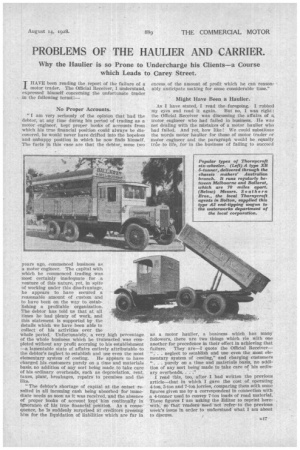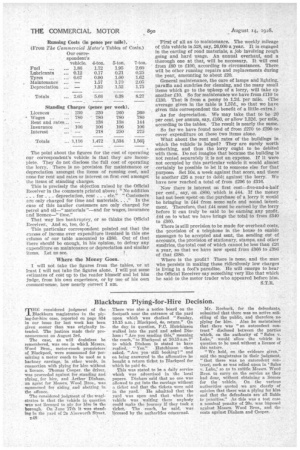PROBLEMS OF THE HAULIER AND CARRIER.
Page 73

Page 74

If you've noticed an error in this article please click here to report it so we can fix it.
Why the Haulier is so Prone to Undercharge his Clients—a Course which Leads to Carey Street.
T HAVE been reading the report of the failure of a 1 motor trader. The Official Receiver, I understand, expressed himself concerning the unfortunate trader in the following terms:— .
No Proper Accounts.
"I am very seriously of the opinion that had the debtor, at any time during his period of trading as a motor engineer, kept proper books of accounts from which his true financial position could always be discovered, he would never have drifted into the hopeless and unhappy position in which he now finds himself. The facts in this case are that the debtor, some two years ago, commenced businesS as a motor engineer. The capital with which he commenced trading was most Certainly inadequate for a venture of this nature, yet, in spite of working under this disadvantage, he appears to have secured a reasonable amount of custom and to have been on the way ta establishing a profitable organization. The debtor has told us that at all times he had plenty of work, and this statement is supported by the details which we have been able to collect of his activities over the whole period. Unfortunately, a very high percentage of the whole business which he transacted was completed without any profit accruing to his establishment —a lamentable state of affairs entirely attributable to the debtor's neglect to establish and use even the most elementary system of costing. He appears to have charged his customers purely on a time and materials basis, no addition of any sort being made to take care of his ordinary overheads, such as depreciation, rent, taxes, plant, breakages, repairs to premises and the like.
"The debtor's shortage of capital at the outset resulted in all incoming cash being absorbed for immediate needs as soon as it was received, and the absence of proper books of account kept 'him continually in Ignorance of his true financial:position. As ñ Consequence, he is suddenly surprised at creditors pressing him for the liquidation of liabilities which are far In excess_ df the amount of profit which he can reasonably anticipate making for some considerable time."
• Might Have Been a Haulier.
As I have stated, I read the foregoing. I rubbed my eyes and read it again. But no, I was right: the Official Receiver was discussing the affairs of a, motor engineer who had failed in business, He was not dealing with the mistakes of a motor haulier who had failed. And yet, how like! We could substitute the words motor 'haulier for those of motor trader or motor engineer and the paragraph would be equally trite to life, for in the business of failing to succeed as a motor haulier, a business which has many followers, there are two things which vie with one another for precedence in their effect in achieving that failure. They are—I quote the Official Receiver". . . neglect to establish and use even the most elementary system of costing," and charging customers " . . . purely on a time and materials basis, no addition of any sort being made to take care of his ordin
ary. overheads. . . I read this, too, after I had written the previous article—that in which. I gave the cost of operating 4-ton, 5-ton and 7-ton lorries, comparing them with some figures given me by a correspondent in connection with a 4-tonner used to convey 7-ton loads of road material. These figures I .am asking the Editor to reprint herewith,' So that 'readers need not referto the previous week's issue in order to understand' what I am about to discuss.
The point about the figures for the cost of operating our correspondent's vehicle is that they are incomplete. They do not disclose the full cost of operating the lorry. There is no provision for maintenance or depreciation amongst the items of running cost, and none for rent and rates or interest on first cost amongst the. items of standing charges.
This is precisely the objection raised by the Official Receiver in the comments printed above: "No addition . for . . . depreciation, rent . . . etc." "Customers are only charged for time and materials. .. ." In the case of this haulier customers are only charged for petrol and oil-" materials "-and for wages, insurance cad licence-" time."
That way lies bankruptcy, or so thinks the Official Receiver, And so, too, do L This particular correspondent pointed out that the excess of income over expenditure itemized in this one column of our table amounted to £380. Out of that there should be enough, in his opinion, to defray any expenditure on maintenance or depreciation and similar items. Let us see.
Where the Money Goes.
I will not take the figures from the tables, or at least I will not take the figures alone. I will put some estimates of cost up to the reader himself and let him judge, from his own experience, or by use of his own common-sense, how nearly correct I am. First of all as to maintenance. The weekly mileage of this vehicle is 528, say, 26,000 a year. It is engaged in the carting of road materials, a job involving rough going and hard usage. An annual overhaul, and a thorough one at that, will be necessary. It will cost from £80 to £100, according to circumstances. There will be other running repairs and replacements during the year, amounting to about 120.
General maintenance, the care of lamps and lighting, paraffin and sundries for cleaning, and the many small items which go to the upkeep of a lorry, will take up another £10. So for maintenance we have from £110 to £130. That is from a penny to 1.2d. per mile. (The average given in the table is 1.57d., so that we have given this correspondent the benefit of a little extra.)
As for depreciation. We may take that to be 20 per cent. per annum, say, £160, or allow 1.32d. per mile, according to the tables. The result is nearly the same.
So far we have found need of from £270 to £290 to cover expenditure on these two items alone.
What about the rent and rates of the buildings in which the vehicle is lodged? They are surely worth something, and thus the lorry ought to be debited with them. Do not imagine that because the building is not rented separately it is not an expense. If It were not occupied by this particular vehicle it would almost certainly be possible to let it to someone else for that purposes Set 10s, a week against that score, and there is another £26 a year to debit against the lorry. We have now reached a total of from £296 to £316.
Now there is interest on first cost-five-and-a-half per cent., say, on 1800, which is £44. If the money had not been spent on the purchase of a lorry it would be bringing in £44 from some safe and sound investment. Therefore, that 144 must be earned by the lorry before it can truly be said to be earning any profit. £44 on to what we have brings the total to from £340 to £360.
There is still provision to be made for overhead costs, the 'provision of a telephone in the house to enable messages to be accepted and sent, the sending out of accounts, the provision of stationary, stamps, and other sundries, the total cost of which cannot be less than £26 a year, so that we have now spent from £366 to £386 of that £380.
Where is the profit? There is none, and the man who persists in making these ridiculously low charges is living in a fool's paradise. Ile will emerge to hear the Official Receiver say something very like that which he said to the motor trader who appeared before him.
S.T.R.




















































































































